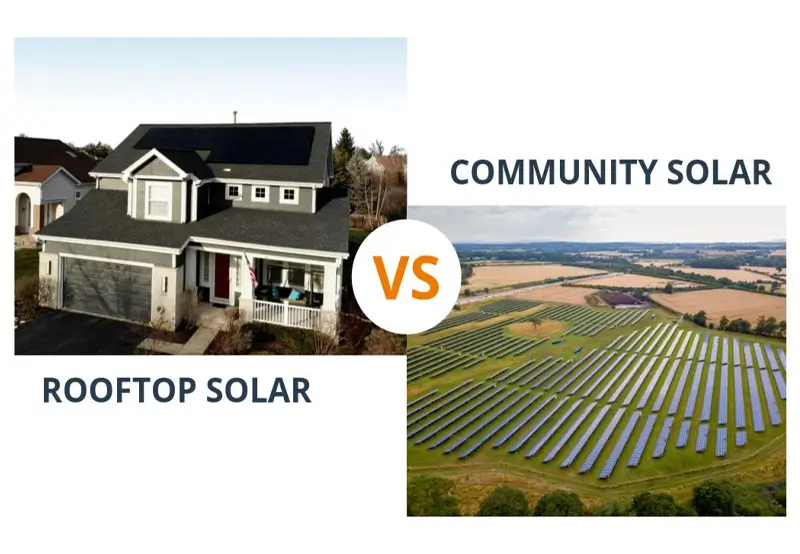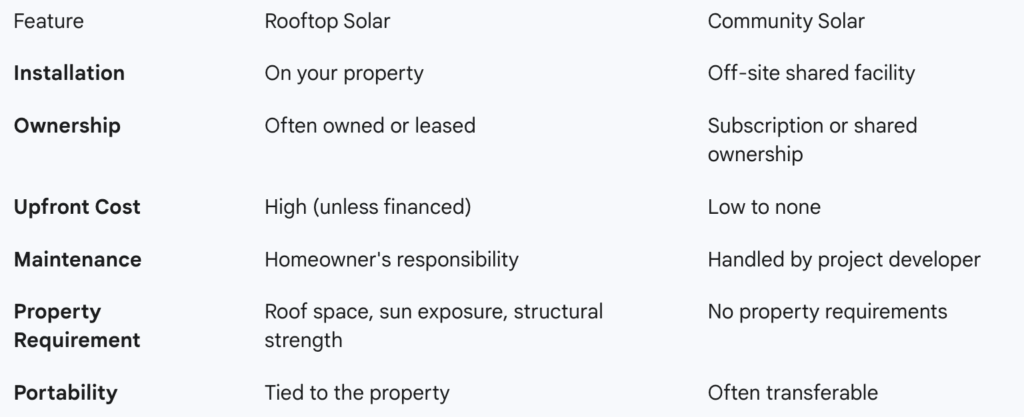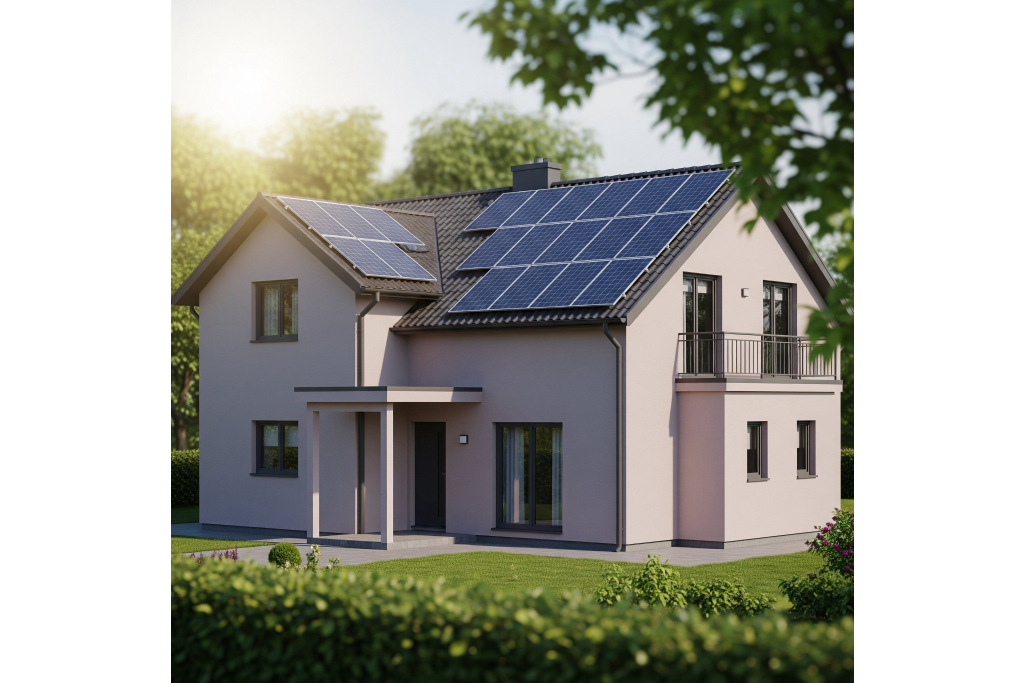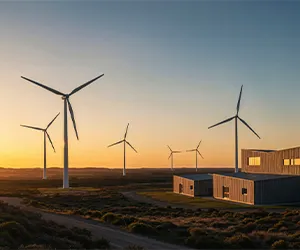Rooftop Solar vs. Community Solar: A Complete Guide to Making the Right Decision
As the world shifts toward cleaner energy solutions, a variety of solar energy options are now available for households and businesses looking to go green. Among these, two standout choices—community solar and rooftop solar—offer distinct benefits depending on your circumstances. Understanding the key differences in the community solar vs rooftop solar discussion is essential to making an informed decision. Rooftop solar is installed directly on your home or building, providing long-term cost savings and energy independence, but it requires an upfront investment and suitable roof conditions. Community solar, on the other hand, allows individuals to subscribe to a shared solar project, making solar power accessible even for renters or those without ideal roofs. It’s a low-maintenance, hassle-free option that removes installation barriers. In this article, we compare both solar energy options—exploring their advantages, limitations, and ideal scenarios—to guide you toward the best fit for your clean energy goals.

What Is Rooftop Solar?
Rooftop solar means putting solar panels on top of a home or building to create clean, renewable power. The system mostly serves the property it’s on, lowering electricity bills and grid use. In most areas, any excess energy generated can be sent back into the community’s power grid with net metering, letting homeowners or business owners earn credits or money for the excess. Solar on the roof provides a clean, affordable energy solution that is ideal for homeowners who have appropriate roof space and long-term energy aspirations. It’s a clever option for boosting energy self-sufficiency in support of a cleaner future.
The Benefits of Rooftop Solar
- Energy Independence: Rooftop solar offers one of the greatest advantages of having control over your power production and consumption. You produce and consume your own electricity and therefore depend less on the grid.
- Savings on Electricity Bills: Your electricity bills can be substantially lowered with rooftop systems. In most instances, surplus power is returned to you in the form of net metering.
- Increased Property Value: Residences with solar panels tend to retain their value better. Homebuyers are drawn to houses with reduced electricity bills and ecological advantages.
- Tax Incentives and Rebates: States and the federal government normally provide incentives such as tax credits, rebates, and subsidies to install solar panels on rooftops.
- Environmental Value: Production of clean energy saves your carbon footprint, toward a cleaner planet.
What Is Community Solar?
Community solar is a shared renewable energy project where individuals subscribe to an allocation of a large, offsite solar array. Electricity produced is injected into the grid, and subscribers receive credits on their utility bills proportional to their share in the power generated. This method allows families, renters, and businesses to benefit from solar energy without having to pay for or occupy space to install individual panels.
The Benefits of Community Solar
- No Installation Required: With community solar, there is no installation or maintenance of solar panels on your site. This makes it suitable for renters or residents who live in apartments or shaded properties.
- Low Entry Barriers: Community solar programs often require little to no upfront cost. Participants usually pay a monthly subscription or buy a share in the project.
- Energy Bill Savings: Subscribers receive credits on their electricity bills, which can lead to significant savings over time.
- Flexible Participation: Some programs allow you to transfer your subscription if you move within the same utility service area.
- Inclusive Access to Solar Power: The benefits of community solar extend to individuals and businesses who otherwise couldn’t access solar energy due to financial, structural, or property-related constraints.
The Solar Energy Options: A Quick Comparison

Is Rooftop Solar Worth It?
Most homeowners wonder, “is rooftop solar worth it?” The response hinges on a number of factors:
- Location: Regions with intense sunlight exposure make rooftop solar more effective.
- Electricity Rates: The higher the utility rates, the greater the impact of savings.
- Incentives: Tax credits and rebates can greatly offset installation costs.
- Home Characteristics: Roof slope, shading, and structural stability are essential factors.
If you have a well-suited home for solar and are long-term residents, rooftop solar can be a great investment—financially and for the environment.
Community Solar vs Rooftop Solar: Key Factors to Consider
Now that we’ve examined the two models, let’s break down some important considerations when choosing your ideal solar energy option:
1. Ownership and Control
- Rooftop Solar gives you complete ownership and control over your system. You decide on the size, design, and energy usage.
- Community Solar typically operates on a subscription basis. You’re part of a larger project, so control is shared or limited.
2. Cost Structure
- Rooftop Solar has a higher upfront cost (often mitigated through financing or leases), but long-term savings are usually greater.
- Community Solar involves a lower or zero upfront cost, making it accessible, though savings may be slightly less.
3. Maintenance
- With rooftop solar, you’re responsible for upkeep, although warranties and service agreements can cover most issues.
- Community solar systems are maintained by the operator, freeing you from responsibility.
4. Environmental Impact
- Both options reduce reliance on fossil fuels and help combat climate change. However, installing rooftop panels directly offsets your household’s emissions, while community solar contributes to broader grid decarbonization.
5. Eligibility
- Rooftop solar requires adequate roof space, minimal shading, and favorable orientation.
- Community solar has no such physical constraints, making it suitable for a wider audience.
Who Should Choose Rooftop Solar?
Rooftop solar is ideal for:
- Homeowners with suitable rooftops
- Individuals seeking maximum long-term savings
- People wanting to invest in their property
- Households with access to solar incentives and tax credits
- Environmentally conscious consumers looking for direct impact
Who Should Choose Community Solar?
Community solar is perfect for:
- Renters and apartment dwellers
- Those with shaded or unsuitable rooftops
- People not ready for large upfront investments
- Individuals seeking low-risk entry into clean energy
- Anyone wanting a solar energy option without the hassle of installation
Hybrid Approach: Can You Combine Both?
Yes! Others get a hybrid solar approach in which they have a rooftop system, but are also subscribing to a community solar project. This may provide additional energy security and environmental effect on a larger scale.
The Future of Solar: Inclusive and Flexible
As solar technology continues to evolve, accessibility is improving. Incentives, smart grids, and innovative financing are enabling more people to take part in the clean energy movement.
Community solar vs rooftop solar is not a battle but rather a spectrum of choices. Both are essential tools in the transition to sustainable energy. The right solution depends on your financial goals, housing situation, and energy needs.
Final Thoughts
Choosing between rooftop solar and community solar is not just a financial decision—it’s a lifestyle choice. Both options empower you to support renewable energy, lower your utility bills, and reduce your carbon footprint. If you value full control and long-term investment, rooftop solar may be for you. If you seek flexibility and lower barriers to entry, community solar offers an excellent alternative.
As more regions embrace clean energy, expect to see better policies, lower costs, and more community solar projects. Whatever path you choose, you’ll be contributing to a greener future—and that’s something we can all benefit from.
Frequently Asked Questions (FAQs)
The key difference lies in location and ownership. Rooftop solar involves installing panels on your own roof and usually owning or leasing them, while community solar allows you to subscribe to a shared off-site solar farm and receive energy bill credits without any installation on your property.
Yes, rooftop solar is worth it for many homeowners in 2025, especially with falling panel prices, improved efficiency, and ongoing tax incentives. If your home has good sun exposure and you’re planning to stay long-term, rooftop solar can offer excellent returns and lower energy costs.
The benefits of community solar include no installation hassle, low or no upfront cost, easy enrollment, bill savings, and accessibility for renters or homeowners with unsuitable roofs. It’s a flexible way to participate in solar energy without owning a system.
There’s no one-size-fits-all answer. Rooftop solar is better for property owners looking for long-term savings and energy independence. Community solar is ideal for those who can’t install solar panels or prefer a no-maintenance, low-commitment solution. Both are great solar energy options depending on your situation.
Yes, many people start with community solar and later invest in rooftop solar once circumstances change—like buying a home or renovating their roof. They’re not mutually exclusive; you can switch or even combine both for maximum impact.












